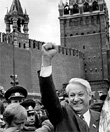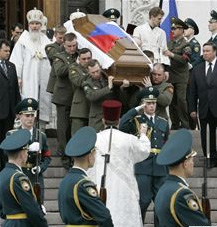Boris Yeltsin first President of the Russian Federation as an independent state from 1991 to 1999 died suddenly on April 23rd. Human rights activists call him the Founder and the Father of free the Russian Federation. A few thousand people came to the funeral ceremony. Violating the Russian Constitution the Moscow Patriarchate held the burial in a cathedral replacing the civil service. (30-APR-07)
Text: HRH/Moscow, by Yanina Savenko. Sources: svobodanews.ru, zaprava.ru, newsru.com
Boris Yeltsin, former Communist functionary, who was put in charge of the Soviet Russian Federation by former USSR President Mikhail Gorbachev, renounced his communist membership in 1990. He was a pivotal figure in both: resistance to the coup d’etat, attempted by hard line Communists in 1991, and in dismembering the Soviet Union. In December 1999, after being reelected twice, he left his post voluntarily. Yeltsin died of a sudden cardiac arrest. Burial service was held in one of the biggest Moscow’s churches – the Cathedral of Jesus the Savior. RF President Putin with his wife, deputies of Parliament, representatives of the government and heads of 20 states came to say their final farewell to Boris Yeltsin.
From totalitarianism to democracy  – Due to Boris Yeltsin the Russian Federation went away from despotic tradition without a civil war, cleansings and repressions, gained almost ten years of democratic freedom and federalism. He created all conditions for normal parliamentary political life, for existence of opposition, for free mass media and civil society, – said leader of the Movement “For Human Rights” Lev Ponomarev.
– Due to Boris Yeltsin the Russian Federation went away from despotic tradition without a civil war, cleansings and repressions, gained almost ten years of democratic freedom and federalism. He created all conditions for normal parliamentary political life, for existence of opposition, for free mass media and civil society, – said leader of the Movement “For Human Rights” Lev Ponomarev.
Destruction of the Communist obedience system
“Boris Yeltsin had one very important achievement – he took us from the terrible claws of the regime. He gave us an opportunity to feel that we are individuals, and that we have a choice. The choice not between cheeses and sausages, but between such existential things as with whom to be, how to live, where to go, what to do and what to think”, said President of the “Holocaust” Foundation Alla Gerber. According to many people, taking the floor at the funeral ceremony, drastic changes in society, lead by Yeltsin, started democratic reforms, promoted Russia’s international influence and formation of civil society.
Yeltsin and freedom of speech 
Under Yeltsin a Constitution, where human rights were put in first place, was adopted. However, the Constitution set priority of executive authorities over representative and judicial bodies. According to human rights activists, the Constitution was good but it was intended for honest people, who wouldn’t abuse power of the government. Moreover, there is no separation of executive bodies and mass media in the Constitution, so that politicians may own TV channels, newspapers and other mass media outlets. After Yeltsin’s resignation politicians used this constitutional loophole. As a result, mass media lost its independence and has become controlled by state. “Nowadays mass media does not realize the right of citizens to information, on the contrary, it forms public opinion for politician’s sake”, – said Yury Vdovin, member of the Movement “For Human Rights”.
Yeltsin’s choice puzzles human rights activists
“Yeltsin’s role in the history of contemporary the Russian Federation is extremely ambiguous. On one hand, he laid the foundation of Russian democracy, but on the other hand, he chose as a successor a man who has been systematically destroying all his achievements”, said member of the Russian Research Center for Human Rights’ Board Liubov Vinogradova.





